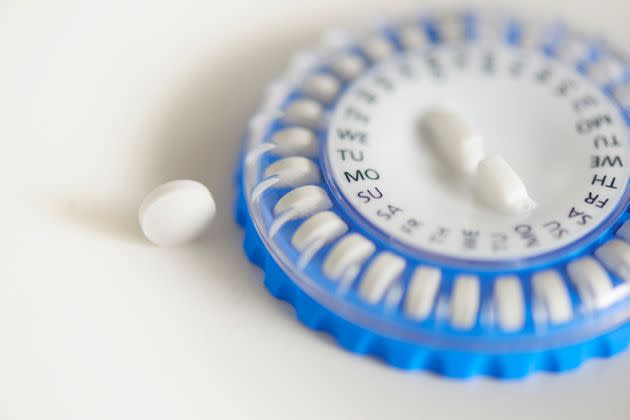Devastating And Devalidating: How The HRT Shortage Is Impacting Trans Women

Trans women are struggling when it comes to the HRT shortage (Photo: FG Trade via Getty Images)
Hormone-replacement therapy shortages have left millions worried across the UK – but while the plight of menopausal women is known, they are not the only ones struggling.
To reaffirm their gender, trans women also take oestrogen – the same hormone cis women take when combatting menopause symptoms – meaning they are also being affected by the same shortfalls in supply.
Three different types of medication that provide oestrogen – Oestrogel (a brand of estradiol gel), Ovestin cream, estradiol patches and Premique tablets – are in short supply and there is “no accurate information on when these will be back in widely available stock”, one online pharmacist told HuffPost UK.
At the moment, the government has predicted the shortage will last until the end of July, but this is expected to be extended.
Approximately a million cis women are thought to be suffering from the shortage. The exact number of trans people affected remains unclear.
HuffPost UK spoke to trans women and charities about these serious challenges and just how HRT is important to them. Here’s what we found.
‘I’ve never had a feeling like it’
jane fae* is a trans woman who has been on HRT for years, and the director of the charity TransActual.
The 64-year-old from Hertfordshire believes the recent efforts to advocate HRT have targeted cis women, meaning trans women feel left out in the cold. Now, she worries the trans community is being blamed for the shortage.
This concern was echoed by trans charity Gendered Intelligence, which told HuffPost UK that rather than “disregarding these shortages as a trans issue, or worse, treating trans people as the cause of the shortages, we should be fighting for proper healthcare for everyone”.
The charity has heard of shortages among the community it supports, with some of its own team members also personally impacted.
fae estimated there’s just a fraction of trans women compared to the number of cis women who are on HRT – but that life without it is equally hard.
Although she hasn’t personally been impacted by the current shortage, she explained that when she came off HRT prior to gender reassignment surgery, she “hit an absolute wall”, which affected her “physically and mentally”.
“If you come off HRT, your body has adjusted so you get both physical withdrawal symptoms and it does seem to be a mood effector. For a lot of people, it tips them into a pretty instant mood depressor.
“When I had to come off mine for a few weeks, it was horrid, it really was horrid. I’ve never really had a feeling like it,” she explained.
The mere fact of being given hormones is intensely validatingjane fae, TransActual
Luckily, these effects were reversible when fae went back on the hormones after surgery.
She explained the important psychological impact of taking HRT too, saying: “Before you’re given hormones, you can feel as though you’re just someone who claims to be trans.
“The mere fact of being given hormones is intensely validating, you’ve got through the processes now, supposed experts believe you. And because it’s got that validating function if something gets in the way of hormones then it sort of… feels like you’ve been knocked back. De-validated.”

Charity director jane fae says a break in HRT can feel "devalidating" . (Photo: jane fae)
Jamie*, an 18-year-old from Manchester, has been personally impacted by the HRT shortage. She was previously using estradiol gel and says she knows a lot of trans women who were moved onto gel because of a shortage in estradiol patches. However, shortages for the gel then began.
Thankfully, Jamie was able to switch to an oral estradiol pill before her prescription completely ran out, but the disruption in HRT supplies was still stressful.
“Initially I was extremely anxious, since I didn’t know how my provider would work around the shortage, but after switching totally to pills and maintaining similar levels my mental health has been fine,” she said.
Physically, Jamie’s switch from one form of HRT to another has thankfully been smooth sailing, but she said this isn’t the case for all trans women.
“I know some other trans people who don’t absorb pills well, and they were forced to [switch to] either injections or patches. The former requires a fair amount of hassle, since you usually need somebody trained and willing to inject, and many GPs won’t do it for private HRT. Some of the people I know who switched had a massive drop in oestrogen levels, which was not great for them,” she said.
“The switch [from gel to pills] did mean I needed to get an extra blood test one month after my prescription fill to check my levels, which since my GP will not perform, I had to pay for.”
Guilia Guerrini, lead pharmacist from digital pharmacy Medino, told HuffPost UK that suddenly coming off HRT can have serious adverse effects.
“For both cis and trans women, interrupting treatment with HRT can certainly cause the body to respond in different ways,” she said.
“Since hormones are involved in regulating mood, emotions and behaviour, it isn’t surprising to hear that depression is one of the main consequences of suddenly not taking HRT anymore.”
Guerrini added: “Hormones also affect our bodies and sexual drives, so going cold turkey could have a negative effect on that. I would say that especially if you are beginning a rather emotional journey that involves taking HRT, such as going through the transitioning process, it can be even more devastating to suddenly have to stop or face shortages.”
Speaking to the i newspaper during the last significant HRT shortages in 2019, consultant endocrinologist Dr Leighton Seal, from London’s Gender Identity Clinic, explained the impact of unintended withdrawal varies according to the stage of transition a woman is in.
If a trans woman hasn’t had gender reassignment surgery and is not on a blocker for male hormones, there may be a risk of male features returning without HRT.
For those who have had the surgery or are on the male-hormone blockers, being without would cause a trans woman to “go into a menopausal state”.
She might experience hot flushes, tiredness, mood instability, and her transition would come to a halt – meaning her breast development and skin softening would stall.
Dr Seal told the i: “That may have more of an impact on her than a woman who’s using HRT to alleviate the symptoms of menopause.”
Long-term withdrawal from HRT stretching out over more than a few months can also cause osteoporosis and cardiovascular issues, according to the doctor.
What about people who have only recently started using HRT?
Priya*, 55, a cis woman who is on HRT herself to ease her symptoms of perimenopause, told HuffPost UK about how her access to the hormones compares to the situation for her daughter, 17, who takes HRT because she is transitioning.
“We had a bit of nightmare with her,” she said. When she first started picking up the prescription for her daughter’s Oestrogel back in September from their local independent pharmacy, Priya said there wasn’t an issue.
But, the decline in supply meant her daughter has since had a one-month gap in her hormone supply, which “definitely” had a negative impact on her mental health, as well as prompting “worry and concern” within their family about the immediate future.
“We’re now really worried about the next round of supply and whether we will get Oestrogel,” Priya added.
Her daughter accesses her HRT via private prescriptions, because, in Priya’s words, the NHS “isn’t functional at the moment” with long waiting times for support.
NHS Guidelines say 18 weeks is the limit from referral to treatment. In reality, the
average waiting time for a first appointment with a gender identity clinic is 18
months, according to evidence submitted to the government by the LGBT Foundation. Other groups say waits are even longer. The NHS has committed to cutting waiting times.
Priya had to take her daughter to around 10 pharmacies before finding a place which had any of the available hormones.
“There was a pharmacy that could get the drugs at the end of last year but they were too highly priced, we couldn’t manage it,” Priya added, illuminating how the cost discrepancies can have a huge impact too.
Her daughter’s private prescription costs around £300 for a three month supply of Estradiol along with Syneral (a hormone blocker), she said, adding that prices have soared recently.
By contrast, Priya pays the standard NHS prescription charge of £9.35 a month for her own perimenopause HRT. Plans announced to cut NHS HRT costs further are expected to be rolled out in 2023.
Priya explained the “admin and management of it takes up a lot of mental energy because you have to put reminders in and assess what you’ve got”.
Even so, she said it “definitely” looks like their family will have to “ration out” their HRT supply.
Some trans women have been able to access NHS prescriptions, though – jane fae confirmed she was able to pay the standard prescription rate for her HRT access.

(Photo: Peter Dazeley via Getty Images)
At the moment, pharmacists are only allowed to dispense a maximum of three months to avoid treatment disruptions. If a particular hormone is not available, patients might be prescribed alternative treatments, or a combination of products.
While they were able to eventually turn to Boots to get the prescription, Priya noted: “Independent pharmacies can’t get a supply, so then it becomes a postcode lottery.”
Trans youth charity, Mermaids, also shone a light on how difficult it’s been for young people. Head of policy and research Kai O’Doherty, told HuffPost UK: “The majority of the people we support do not even have access to hormones.
“Under 16s are not prescribed HRT, and even those over 16 who are able to obtain access are forced to endure NHS waiting times upwards of three years for an initial appointment.
“Unfortunately, accessing any gender healthcare services right now is incredibly difficult for our young people with numerous delays and this illustrates why we need an overhaul of the current gender services to ensure trans people are getting the same quality of care as everybody else.”
Are cis women and trans women being treated equally?
Priya speculated: “The other question I wondered about was if pharmacies ‘prioritise’ people within the pharmacy.”
However, Guerrini cast doubt on the claim that trans people were not being treated fairly when it comes to pharmaceutical access, saying: “If this was true, it would be very sad to hear.
“To my knowledge however, this is not the case, we have definitely not been instructed to treat prescriptions differently. I am not aware of any prescribing guidelines that suggest this.”
fae claimed that the government has shown more interest in the struggle cis women are facing, but has not not acknowledged how trans women are coping.
She said: “It certainly gives the impression that they are valuing one category of woman over another,” adding that it feels like Downing Street is “culture-warring it”.
Jamie has also seen trans women blamed for the HRT shortage online, which she said is incredibly frustrating.
“Simply looking at the numbers it doesn’t make sense. Most trans people don’t even get their HRT through UK clinics, rather from overseas to avoid complications with prescription fills, and even fewer use gel (many use oral, patch or injection),” she said.
“Trans people had already been seeing price hikes overseas for the gel forecasting the shortage, but it’s evident the main cause of it is a combined increase in awareness for cis women taking HRT for menopause (very good thing!), and the medical industry being extremely slow to react.”
Trans people have already faced significant challenges this year, after being excluded from the government’s conversion therapy ban. And fae believes the government is “trying to set two classes of people against one another”.
“Both cis women and trans women need them [HRT meds]. It’s very clear. The government needs to sort out supplies for both groups and do so pretty quickly,” she said.
Gendered Intelligence echoed this sentiment. “Reproductive healthcare is all too often overlooked, with estradiol in particular suffering from frequent production shortages,” the charity said.
“Attacks on trans healthcare around the world have contributed to HRT scarcity, while in the UK post-Brexit supply chain issues have worsened existing shortages.”
Trans men are impacted by HRT shortages too
During our research we heard from several other trans women who’ve been impacted by the shortages, but asked not to be directly quoted in the article.
We also heard from Ashley Wood, a 23-year-old trans man from Aberdeenshire, who said trans men are being impacted by testosterone HRT shortages, but this isn’t being talked about.
Ashley has had issues accessing Testavan, a form of testosterone gel, until very recently. In early April he put in a request for his usual prescription but when it arrived a few weeks later, the pharmacist had ordered an alternative medication – prostap injections – instead.
This left him without “adequate testosterone for two weeks”, he said.
He immediately reordered Testavan via his online pharmacy portal, but the prescription did not arrive. When he visited the pharmacy again in person, they admitted their supplier was out of stock.
“I was very lucky that they found one box of Testavan for me, however it is out of stock with the supplier right now and I am afraid that I am not going to be able to get a hold of it again,” he said. “I have never had this issue before.
“In emotional terms it has made me feel uneasy, because even days off hormones and things can begin to revert back, and my testosterone relieves the majority of my gender dysphoria, so without it, it puts me in a very dark place and renders me unable to cope.”
What has the government said?
A Department of Health and Social Care spokesperson told HuffPost UK: “We recognise the importance of meeting the specific healthcare needs of transgender people and it is a cornerstone of the NHS that it provides services to those who need them with no discrimination.
“Some transgender people who use HRT may be affected by the current supply issues and we understand how distressing this can be. However, most HRT products – including alternatives to those experiencing supply issues - are available.
“Anyone who is worried about access to HRT or is unable to access HRT should speak to their GP or pharmacist.”
We shared concerns with the Royal College of GPs that trans people were not the priority for HRT access.
In response, Professor Martin Marshall, chair of the Royal College of GPs, said: “GPs work hard to ensure all patients receive the treatment that they need when they need it. In instances where their medications are not available, for whatever reason, GPs will work, often with pharmacist colleagues, to see if an alternative treatment can be prescribed until shortages are resolved.
“The College is concerned to see supply issues around the provision of some preparations of HRT, and we understand the distress this is causing to many patients. As such we have continued to call for this issue to be resolved as quickly as possible, to ensure we’re able to deliver the most appropriate care to our patients.
“While we appreciate the seriousness of the current situation and the frustrations patients are experiencing, we urge them not to share HRT medication as this could lead to serious side-effects.”
* jane fae chooses to spell her name in lower case, Jamie chose to omit her surname from publication, and Priya is a pseudonym provided to offer anonymity.
This article originally appeared on HuffPost UK and has been updated.

 Yahoo Movies
Yahoo Movies 
